Happy birthday, William Shakespeare! Well, happy death day, at least. We observe both the birth and the death of the Bard on the date he died, April 23, though his birthdate has not been confirmed.
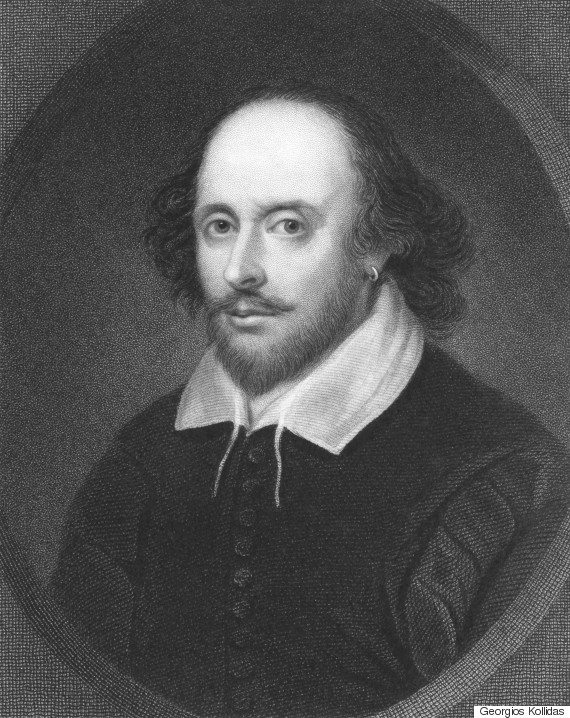
Billy, not yet rolling in his grave.
Here's what we do know: This is the 399th anniversary of Shakespeare's death, and his outsize importance to Western culture looms as large as ever. Christopher Marlowe would be lime-green with envy over the popularity of his one-time rival's plays; there are entire theater troupes devoted to performing Shakespeare, and the finest actors jockey to commit their portrayals of Hamlet and Lady Macbeth to film.
Oh, and then there are the remixes. "West Side Story," "Kiss Me, Kate," A Thousand Acres -- many of Shakespeare's plays were themselves retellings of historical events or classic tales, and the appeal of the narratives has only grown with his magical touch. One can't help but wonder, however, if some of these adaptations would make the great wordsmith squirm, especially the vast array of teen flicks cannibalized from his oeuvre. "Twelfth Night" as a teen sex comedy? Umm... okay.
In fact, the cross-dressing comedy seems to have particular appeal for the makers of teen movies. "Twelfth Night" adaptations have been set on high school soccer teams, motocross events, and journalism competitions. No matter where, a lovely lady gets to prove an easy point about girl power while some fake homoromantic tension is ginned up between the lady in drag and the man she falls for. Lowbrow gold.
Of course, in Shakespeare's time, the constant cross-dressing (movie-makers could also try "As You Like It," though for some reason they seem stuck on "Twelfth Night") was far more practical and complex than it is today, as all of the female parts were played by boys or young men. Not only was it fairly easy for these actors to be "convincing" in male garb, the device was a knowing wink at the audience, who knew the actor was a man playing a woman pretending to be a man. Somehow Amanda Bynes in a wig doesn't carry quite the same impact.
So, in celebration of the past 399 years of Shakespearean spin-offs, I rounded up seven teen-geared movies based on Shakespeare's plays and tried to look at them through the Bard's eyes:

"She’s the Man"
"Twelfth Night" isn’t as popular as "Romeo and Juliet," as Shakespeare plays go, but somehow it’s inspired just as many teen-geared adaptations. Apparently movie execs love putting girls in drag and making homoerotic jokes (until she’s revealed to be, thankfully for heteronormativity, a girl). "She’s the Man" was an Amanda Bynes vehicle back when she was still a star, and featured Channing Tatum before he really was one. Bynes plays Viola Hastings, a girl who pretends to be her brother to get onto a soccer team. And so, we have a typical girl in film-quality male wigs shouldering the weight of a Shakespearean masterwork. Oh, boy.
The Bad: "She’s the Man" makes the mistake of many adaptations that lack confidence in their spin: It overcompensates by rigidly adhering to unnecessary details. Thus, Viola remains Viola, and Duke Orsino, her love interest, remains... Duke Orsino. Yes, Channing Tatum plays a teenage soccer star named Duke. Orsino. They play for a boarding school called Illyria. Gosh, I wonder what play this is based on.
Maintaining the same characters does not a successful modern adaptation make, however. In drag, Bynes (surprise surprise) looks like an overgrown nine-year-old, and nothing like her brother, Sebastian, and yet we’re supposed to believe, for the purpose of the plot, that people can’t tell them apart. She and Duke are roommates at Illyria, which seems to have been set up to create as many (apparently) romantic moments as possible -- Viola/Sebastian hugging Duke too long, Viola/Sebastian jumping into Duke’s arms when she sees a spider, Viola/Sebastian casually telling Duke how hot he is. Thigh-slapping every time.
Oh, and of course, there’s the hilarity of Duke’s squeamishness about possibly having a gay or bisexual friend. Shakespeare at least had the sense to find it all poignant rather than fodder for cheap homophobic jokes and forced genital exposure at soccer games.
The Good: This is a really good movie to watch with your best friend over a few bottles of wine. And listen, it’s probably best if we just don’t tell William about this one.
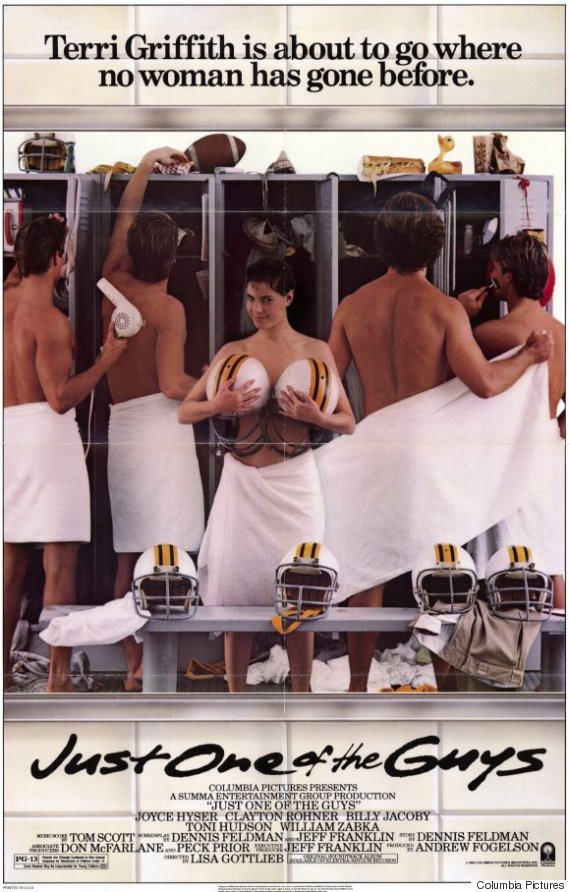
"Just One of the Guys"
"Twelfth Night" makes yet another appearance! It’s not quite as excruciating for Billy W. this time, we hope. In this 1985 comedy, Terry Griffith, a gorgeous and studious high school journalism student grows frustrated that her beauty prevents others from taking her career aspirations seriously. She dresses as a boy, transfers schools, and prepares to receive the accolades she deserves, while, of course, falling in love with a new classmate who thinks she’s a dude (lol).
The Bad: Acting chops were clearly not high on the list of requirements for the cast of the movie, but that's not the most grating offense. Using Shakespeare as an excuse for jockstrap pratfalls and pants-stuffing gags seems a bit cheap, and this juvenile flick skimps on neither.
Comic relief is also provided by Terry’s 15-year-old brother, whose sex obsession is so luridly over-the-top it’s not even chuckle-worthy. "Ha ha, teenage boys are all borderline, if not actual, sex predators!" this movie winks. I’m not sure Billy W. was totally above the teen sex comedy genre, but he would probably have appreciated a bit more subtlety, especially for an adaptation of the elegant "Twelfth Night."
The Good: It may not be saying much, but, at least in comparison to Gwyneth and Amanda, Joyce Hyser makes a pretty convincing, and even dashing, young man. It’s not difficult to imagine popular girls swooning over the becostumed Terry. And there’s a little satisfying social commentary in there; after Terry’s journalism teacher suggests she be a model instead, she rages at her brother, “Your [porn-covered] room is why my life is totally screwed up! You guys think beautiful women are nothing but decorations!” Sad but, well, pretty much true.
Terry also has to learn that her distracting sex appeal wasn’t the only thing holding her back -- even as a boy, her writing needs some work -- so lessons are handed out all around. Society, consider yourself fixed!
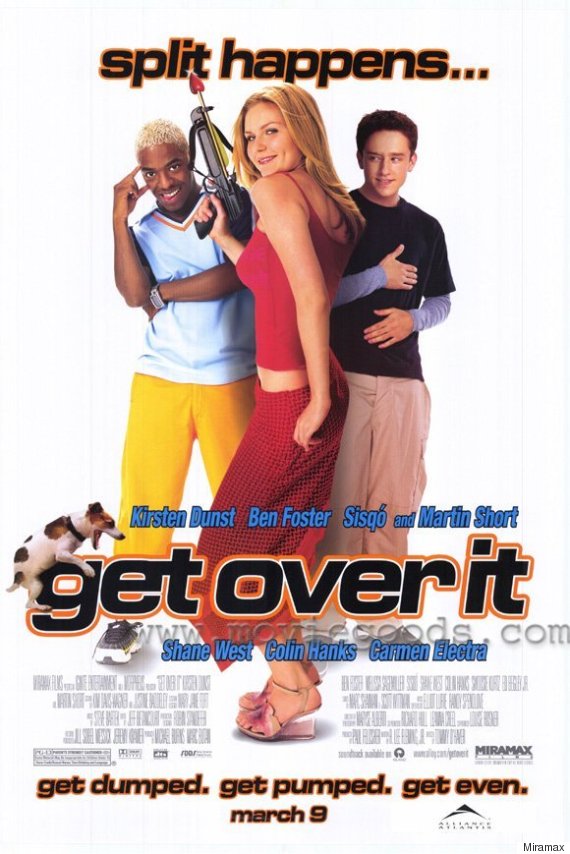
"Get Over It"
This Kirsten Dunst flick revolves around a high school musical production of "A Midsummer Night’s Dream," and the all-too-familiar love quadrangle playing out among the cast. It’s hard to say what’s more bizarre: That a major teen rom-com was based on "A Midsummer Night’s Dream" (y’know, the one with magical fairy dust) or the campy, absurd execution. There are flashbacks encased in cartoon thought bubbles. There are daydream sequences set in poorly produced magical forests. There’s Shane West. Oh, yes, there’s Shane West.
The Bad: Ben Foster (current sexual awakener of the queenly Robin Wright) plays the saddest of sad sacks; dumped by his childhood crush/high school sweetheart Alison, he spends the entire movie moping around like a wounded puppy with poor emoting skills. For some inexplicable reason, Kelly (Kirsten Dunst), his friend’s younger sister and a theater geek, takes an interest in him, helping him land a role in the school musical to impress Alison.
Unfortunately, Alison is now dating Striker (Shane West), a former boy band member who has landed in their regular high school (of course) and has a truly ludicrous British accent. It’s so bad that whenever he speaks it's impossible to pay attention to what he's actually saying because you're trying to figure out what the hell kind of accent he's trying for. Other characters insinuate that he’s faking it to impress the ladies, but one might suspect the director had to add in those lines after cringing through West's accent, which I would describe as more "burnt tongue" than "British" at least 80 percent of the movie.
Throw in those tacky, low-budget flashbacks and daydream sequences, and the modern viewer has likely had enough. But what would break Shakespeare’s heart? Probably the cheesy song-and-dance numbers inserted directly into his script. "A Midsummer Night’s Rockin’ Dream" was NOT the plan.
The Good: Despite Ben Foster’s dullness, Kirsten Dunst manages to sell her hopeless crush on him, injecting a bit of almost Bard-worthy pathos into this ridiculous movie. Oh, and the real star is Martin Short, god among comic character actors, who reinvigorates the Bottom archetype as the insanely egotistical, ridiculously untalented high school theater director. Watch the movie, but watch it for Short, who transforms into a clown worthy of Falstaff. And Shakespeare, well, he knew the importance of being humorous.
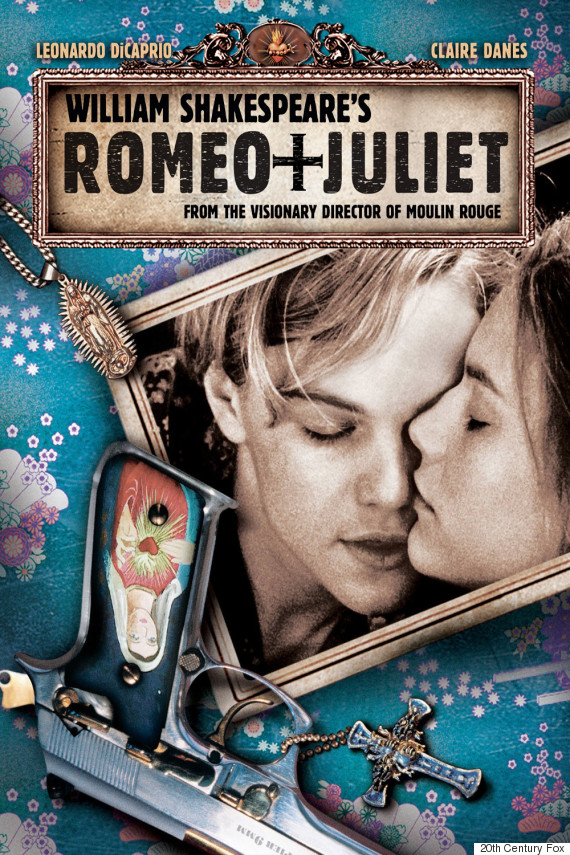
"Romeo + Juliet"
It’s dangerous to hate on this movie -- who among us is not a 12-year-old girl circa 1997 when it comes to Leo? -- but Baz Luhrmann has much to answer for here. He tries to violently force together Shakespeare’s anachronistic dialogue with a futuristic, Medieval-punk setting, and drenches the whole affair in his patented glitter and flash and head-banging music. The result: confusion, incoherence, and strained suspension of disbelief.
The Bad: If you’re determined to use Shakespeare’s original words, I’m afraid you have to commit to a bit. If a character refers to his “sword,” he just can't be wielding what is clearly, to the audience, a gun. Meanwhile, the script has been heavily chopped down, making more room for bloody action sequences and breathless Claire Danes and Leonardo DiCaprio embracing in a pool. None of the actors seem particularly adept at performing Shakespeare, which is its own specific skill for the modern player, leading to very puzzling scenes wherein no one’s lines can be understood.
The Good: Okay, so we all love some Danes and DiCaprio, especially when they’re having a romantic wet T-shirt contest. I’ll allow it. Seriously, the actors have the youthful innocence and fervor to sell their roles, and the chemistry to make us believe in their romance. Maybe that’s the most important part of "Romeo and Juliet," anyway. There's probably a reason Shakespeare chose to make his own adaptation of the old tale to begin with.
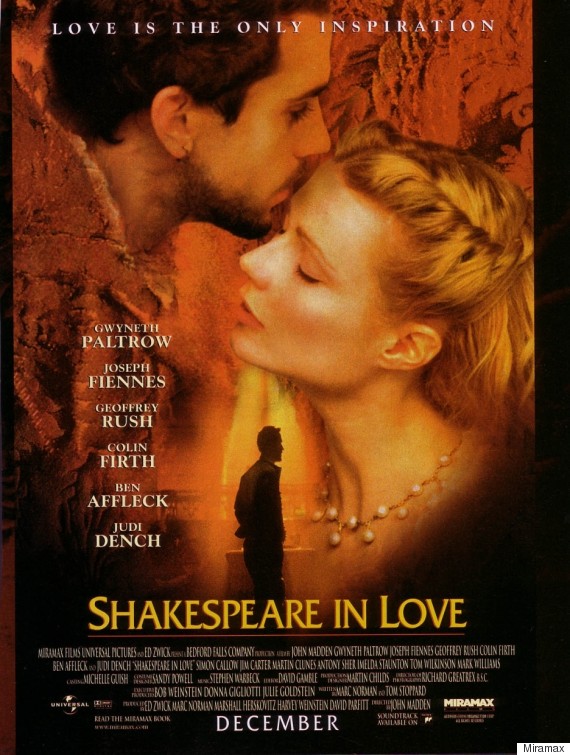
"Shakespeare in Love"
Yes, I know it won an Academy Award (and is not technically a teen movie). I don’t care. This movie is for hormonal 15-year-old girls who want the kind of romance Freddie Prinze Jr. can’t provide. (I would know.)
The Bad: This version of history is so glossy it’s hard to take it seriously. Despite Gwyneth Paltrow's/Viola’s unlikely access to extremely realistic wigs and false mustaches (remember, this is Elizabethan England), she looks and sounds like a teenage girl. Despite the famously bald and lumpy portrait of Shakespeare we’ve all seen, Joseph Fiennes portrays him as a lean, hirsute dreamboat.
For the convenience of the film’s sappy narrative, Shakespeare and Viola meet when she sneaks into an audition for his new play: "Romeo and Juliet," believed to have been written in 1597. They begin a very sexual adult relationship when he discovers her true identity -- not the sort of behavior typically condoned by the real Shakespeare, at least among his female characters. When she leaves him, a few months later, to accompany her new husband to Virginia (a colony that, um, did not yet exist), he begins to write "Twelfth Night," inspired by his cross-dressing love. "Twelfth Night," a play dated to around 1602 (that's five years later, for those keeping score at home).
Historical accuracy cannot stand in the way of love.
The Good: "Shakespeare in Love" is unbearably sentimental -- at one point, they recite Romeo and Juliet’s love poetry to each other while making love -- but hey, Shakespeare himself wrote that dang poetry. He couldn’t have been that appalled by people savoring the romance of his words, the invocations of bounty’s boundlessness and love’s depth. The film even works in a little of his bawdy humor. And would Shakespeare really mind being played by doe-eyed Joseph Fiennes? Maybe he’s not rolling all the way over.
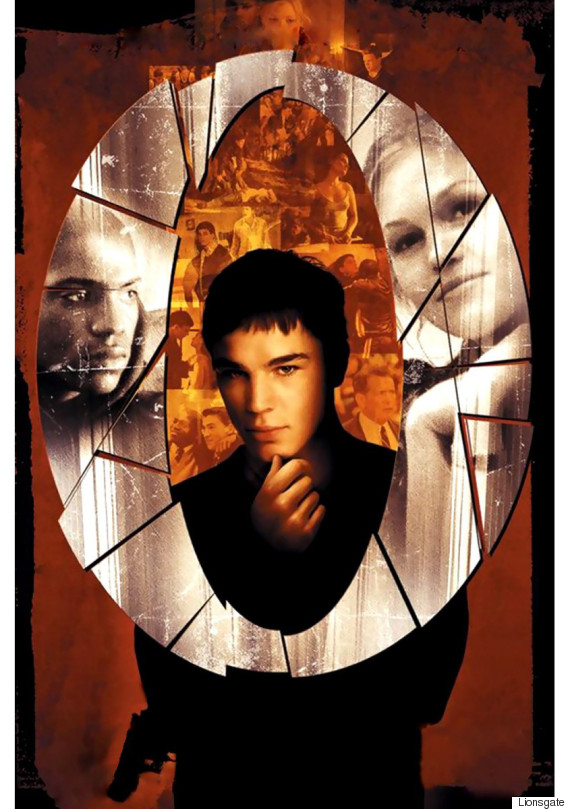
"O"
One of the most truly gut-wrenching of Shakespeare’s tragedies, "Othello" presents particular challenges to the modern adaptation. For example, given contemporary views on women’s sexuality, death no longer seems like a rather harsh punishment for infidelity, but a totally psychotic one. This makes Othello’s post-murder realization of Desdemona’s innocence difficult to sympathize with, from the modern eye. Shouldn’t he just have not murdered her to begin with? This doesn’t even get into the questionable racial politics of a black protagonist cast as a volatile killer. All of which is to say that "O" is a surprisingly effective update, given the problematic plot. Still...
The Bad: "O" got off to a demonstrably bad start. Originally slated for April 1999, the film was put on ice for a couple years after the Columbine High School shootings. The violence of the "Othello" remix, which is set on a high school campus, surely seemed too painfully timely.
And those racial problems? They don’t disappear, though we’re set up to view Odin James (Mekhi Phifer) as the victim of psychological manipulation and entrapment by Hugo (Josh Hartnett), his jealous basketball teammate. Roger Ebert pointed out that Odin’s initials are, ahem, O.J. -- did we really need a reminder that there’s a real black star athlete out there who is widely believed to have killed his white romantic partner? Ick.
Plus, the domestic violence issues: At first we feel outraged that Des’s father doesn’t want her to date Odin, but given that his response to perceived infidelity was to kill her, it seems like old dad was right, even if Hugo drove O to the brink of the crime.
The Good: Hartnett and Phifer, as well as Julia Stiles as Des, are perfectly cast and bring nuance and humanity to their roles. And given the near-impossibility of updating "Othello" for today, this adaptation does a remarkably solid job. It furnishes Hugo with a credible motivation; invests much of the runtime in depicting Hugo’s ingenious scheming and Odin’s mental unraveling, complete with insomnia and illicit drugs, to make his reckless crime more comprehensible; and it makes Shakespeare’s tale seem profoundly relevant and alive today. The script is even, at many points, beautiful. The original playwright would probably give it an approving nod -- for teens, at least. (Maybe they’re not ready for the real thing.)
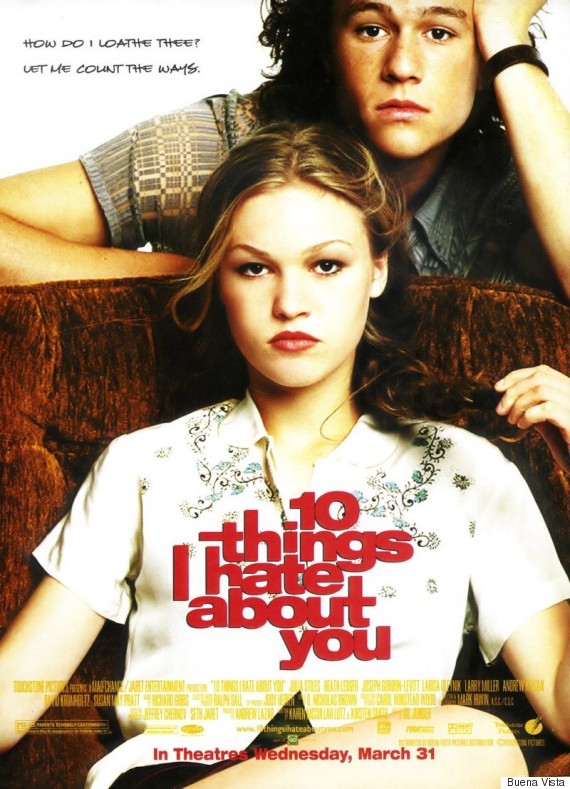
"10 Things I Hate About You"
"The Taming of the Shrew" is a rough play to update for modern life -- perhaps the roughest among Shakespeare’s comedies, if not his whole oeuvre. The plot revolves around the quest for an obedient wife, and the happy ending depends on the titular shrew becoming one. Somehow, though, "10 Things I Hate About You" isn’t entirely awful. Maybe it’s Heath Ledger, or rockin’ nineties fashion, but the movie is pretty lovable.
The Bad: Okay, so let’s get this out of the way: The ending still involves an independent woman finding “happiness” via romantic love. Thank God she found a man, said feminists everywhere! Also, who are these modern parents who insist that younger siblings can’t date until their older siblings do? Find another plot device for the 20th century, people.
The Good: While "The Taming of the Shrew" is the story of Petruchio conquering his recalcitrant wife through food deprivation and emotional abuse, "10 Things I Hate About You" makes Kat (Julia Stiles, a.k.a. the shrew) the star of the show. Can we talk about how badass Kat is? Though a teen rom-com heroine, she is a feminist who reads Sylvia Plath and listens to riot grrrl music. Sure, she needs to tone down her bad attitude a bit, but it’s also kinda refreshing that she allows herself to act abrasive in a world where women are expected to smile and act accommodating. Kat isn’t a shrew, but she is definitely not a nice girl.
Heath Ledger’s Patrick (Petruchio), meanwhile, isn’t a devious manipulator, but another antisocial teenager with some rough edges that need to be sanded down. He accepts money from Cameron, who wants to date younger sister Bianca, to get Kat into the dating game, but as teenagers in rom-coms so often do, he realizes that he’s actually starting to fall for her. Whoopsie! He has no real designs to change her personality -- though, fortunately, they both warm up a bit once they find they can relax with each other. That’s love.
Oh, and Kat’s sonnet? Truly inspired use of the Shakespearean sonnet form. Way to turn the poem completely around in its last two lines -- the Bard would be proud.
For more on the Bard, check out: "Here's What Actually Happens In Shakespeare's Most Famous Plays."
Related
Before You Go










